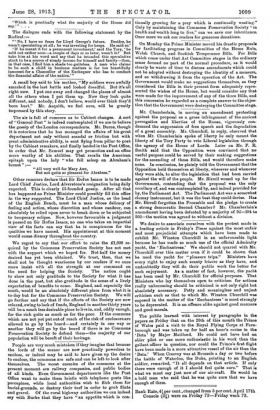Mr. Chamberlain, in moving an amendment protesting against the proposal
as a gross infringement of the ancient prerogative and liberties of the House, vigorously con- demned the suppression of free speech and the degradation of a great assembly. Mr. Churchill, in reply, observed that when Mr. Chamberlain spoke of liberty he only meant the liberty of the Tory Party to veto Liberal legislation through the agency of the House of Lords. Later on Mr. F. E. Smith said that the Opposition were convinced that no useful purpose could be served by their making suggestions for the amending of these Bills, and would therefore make none. In conclusion, he plainly told the Government that the Opposition held themselves at liberty, wherever and whenever they were able, to alter the legislation that had been carried against the will of the people. Mr. Birrell wound up for the Government, contending that the proposal was the only corollary of, and was contemplated by, and indeed provided for by, the Parliament Act. The Parliament Act was a somewhat clumsy instrument, but it was the beat they could devise. Has Mr. Birrell forgotten the Preamble and the pledge to create a strong democratic Second Chamber ? Mr. Chamberlain's amendment having been defeated by a majority of 92-294 to 202—the motion was agreed to without a division.


























































 Previous page
Previous page